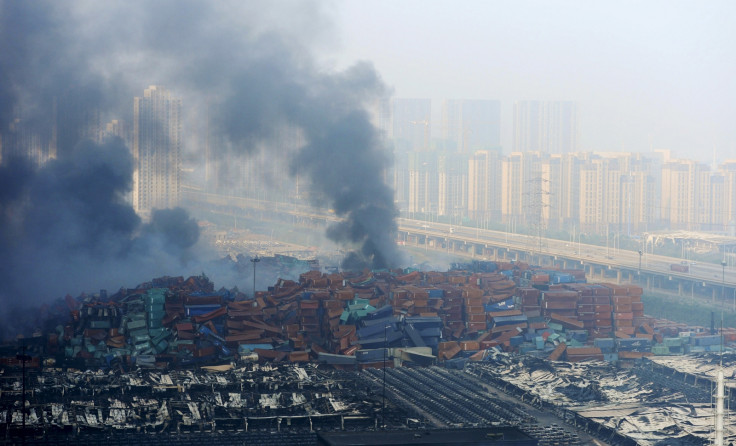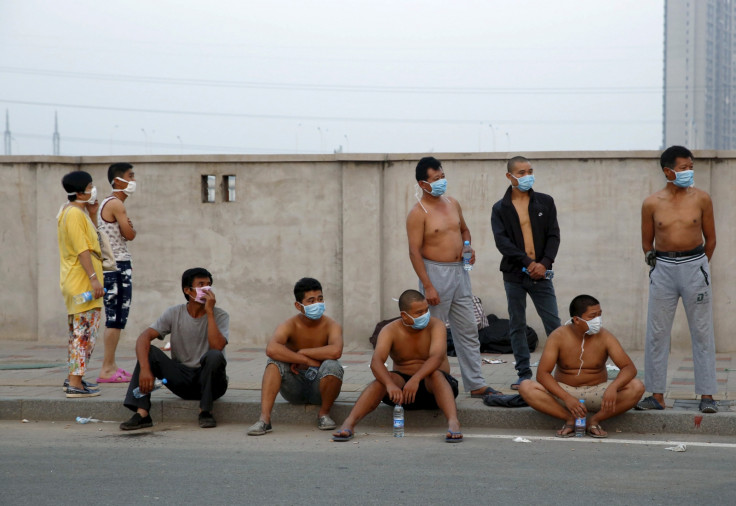China explosion: Military sends chemical specialists to Tianjin port blast site

A team of 217 military specialists in nuclear and biochemical materials are now at the northern city of Tianjin to help with rescue operations after two explosions at a warehouse at the port killed 50 people and injured more than 700 people.
Seventeen of those killed are firemen sent to the site to fight the blaze following the two explosions. Of the injured, 71 are in critical condition and dozens of people are still missing, Xinhua news agency reported. The Tianjin Port Group Co said dozens of its employees are still unaccounted for.
The news agency said the specialists, all from the Chinese People's Liberation Army Beijing Military Area Command, will be led by Deputy General Chief of Staff Wang Zhengrong.
The military team has so far tested the air around the site for toxic gases and has ordered rescue teams to wear heavy protective clothing in the vicinity due to ongoing risks of leaking poisonous chemicals, the news agency said.
"According to our preliminary detection efforts, we suggested that rescue teams move upwind," said Du Jiang, the team's political commissar. The news agency said there are concerns that the thick smoke engulfing the blast site may contain poisonous substances.

Xinhua said a pungent smell can be detected about one kilometer from the blast site and residents have been complaining of stinging eyes.
The People's Daily said that firemen are now trying to remove 700 tonnes of sodium cyanide reportedly stored in the area where the blasts occurred. According to Beijing News, sodium cyanide has been detected in the sewage.
Potassium nitrate and sodium cyanide were believed to have been stored in the warehouse that caused the blast, the newspaper said.
Wen Wurui, head of Tianjin's environmental protection bureau told a televised briefing that harmful chemicals were detected in the air but they were not at "excessively high" levels, AFP reported.
The city has set up 17 monitoring stations to check on air quality and five for water. Wen said three sewage outlets to the sea have also been closed.
It noted that at a news conference on Thursday (13 August) a panel of officials were bombarded with questions about the chemicals in the tanks that exploded. They refused to give details and the briefing session ended abruptly with the officials "rushing off stage."
In addition, the military has sent in 130 personnel to help with the rescue operations which includes handling drones to observe the site and helicopters to drop water on the flames.
A total of 125 officers and soldiers on reserve duty at the Tianjin Garrison Command are also currently helping out at the blaze site, Xinhua said.
The PLA Beijing Military Area Command has also sent 45 medics to set up clinics about three kilometers from the blast site to treat patients.
Cause of explosions still pending
An official from China's State Administration of Work Safety said the cause of the two blasts is still pending as the blaze at the scene has not been completely put out.
"Only after the fire is totally put out, can we find out the exact place where the fire started, and subsequently the cause of the explosion will be figured out," the unidentified official said, according to Xinhua.
The news agency said executives from the storage centre's owner, Tianjin Dongjiang Port Rui Hai International Logistics have been taken into custody by police. It described the facility as a storage and distribution centre for containers of dangerous goods, including chemicals.
A total of 3,500 residents have been moved to 10 schools nearby after their homes were damaged by the blasts and the numbers could rise to 6,000, Zhang Yong, the head of the Binhai district government told reporters.
Beijing, which is located about 120km northwest to Tianjin is not expected to be affected by the blasts, Wen told reporters. Tianjin has a population of over 15 million people.
© Copyright IBTimes 2025. All rights reserved.




















